13 Myths About Onions You Probably Thought Were True
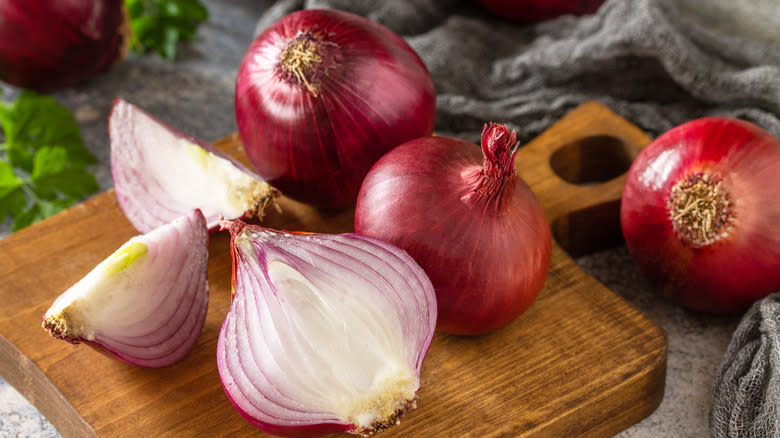
The humble onion, which acts as the basis for countless recipes, has actually been grown by humans for upwards of 5,000 years. And in that time, they've not just been used as food, but have also gained a central role in various rituals as well as cultural and religious practices. They have also become a food that's closely associated with superstitions; for example, dreaming of cutting onions has been said to be a sign that your enemies are soon to beat you in battle. Elsewhere, onions have been used in weather prediction, with some people swearing by the belief that thicker onion skins can indicate a colder winter approaching.
But, while these might sound pretty out there and aren't as commonly believed these days, there are some myths about onions that have stood the test of time?. And, as well as myths that relate to how well onions help us sleep or how effectively they can ward off disease, there are also some less flashy, but no less important myths about how we store, eat, and cook onions. We're here to dispel all of these mistruths.
Read more: 12 Vegetables And Fruits That Used To Look Very Different
Myth: Sliced Raw Onions Are Poisonous
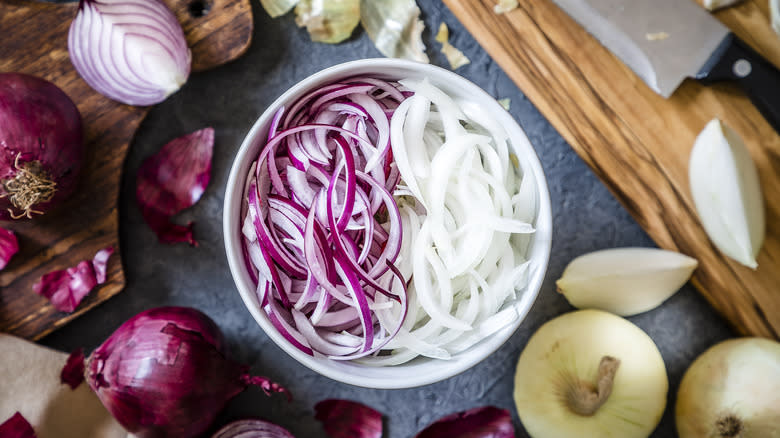
One of the most commonly found myths about raw onions is that they somehow become harmful if they've been sliced and left out in the open. The presiding theory behind this comes from the traditional use of them as a cure for colds or flu, which has led people to assume that they're somehow a magnet for bacteria -- or else that they develop toxicity once exposed to air.
This couldn't be further from the truth. "There is no validity [to this myth] at all," states registered dietitian and food safety specialist Ellen Steinberg (per EatingWell). In fact, onions are pretty good at preventing bacteria from growing on them, thanks to their acidity, meaning that they can potentially remain edible for longer than other vegetables.
What will happen to them, though, is that after a certain amount of time, they'll begin to taste less fresh and sharp. And, where sliced onions do start to become dangerous is when you leave them out for too long. Sliced raw onions will stay fresh for up to 10 days in the fridge, but they won't last as long at room temperature. And, when left for too long, onions may start to grow mold or develop bacteria that can lead to foodborne illness.
Myth: Keeping Whole Onions In The Fridge Keeps Them Fresh For Longer
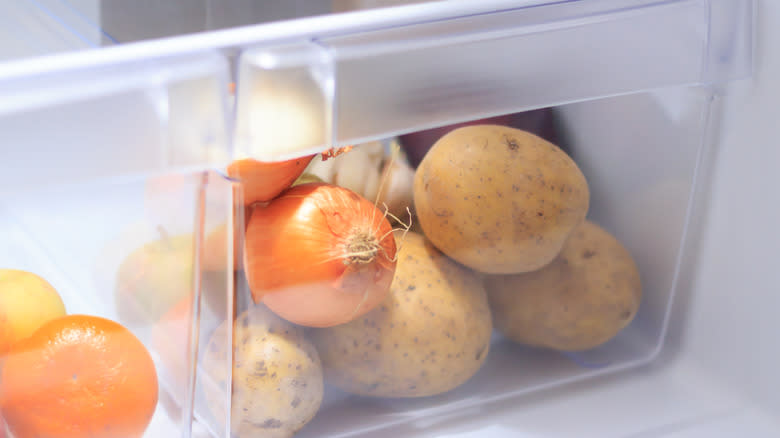
It's generally the case that foods last longer when they're chilled than at room temperature, so it's pretty natural to think that this would be the case with onions. Unfortunately, though, that's a common misconception. Onions actually fare better at room temperature, as they are usually cured after being picked which dries out their exterior surface and helps to preserve them for longer. When you put them in the fridge, however, that hard work is undone. The moist air in the fridge seeps into the onions, meaning that they spoil quickly.
Instead, onions should be kept in a dry environment, ideally at a slightly cool temperature. Keeping them out of direct sunlight is also important so that the sun doesn't heat them up and cause them to spoil faster. One exception to keeping onions in the refrigerator is when they've been peeled and sliced, after which they should be kept in an airtight container at a low temperature. You should also keep green onions in the refrigerator, as keeping them at room temperature, or in a dry environment, can cause them to wilt faster.?
Myth: Raw And Cooked Onions Have The Same Nutritional Value
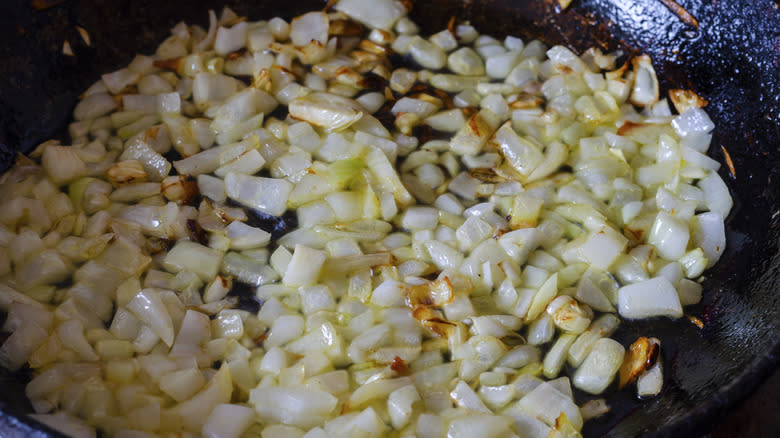
Whether onions are better for you cooked or raw is the subject of a surprisingly heated debate. And, some folks claim that it doesn't matter whether you're eating them raw, or bubbling them in a pot for hours -- no matter how you enjoy them, they remain the same nutritionally.
The truth is a little more complicated than that. Heating the onions can change or lessen certain compounds in them, thereby altering their benefits. For example, pyruvate (or pyruvic acid), a key component of onions that helps to keep your blood from clotting, is in pretty abundant quantities when onions are raw. When they're cooked, however, the pyruvate content in the onions drops, making them less effective for this specific function.
Cooking onions also results in a drop in sulfur content, one of the key compounds in onions, and the main cause of their pungent smell. While we don't tend to think of sulfur as an essential mineral, it has an important function in keeping your body tissue in robust, working order by providing the amino acids methionine and cysteine, and also helps our bodies process food properly.
Myth: Onions Can Help Fight Off The Flu

One of the most pervasive myths about onions is their ability to help us fight diseases. It's a mistruth that's taken many forms, from people believing that leaving them around the home will kill pathogens, to the thought that placing them in your sock will somehow allow an onion's disease-fighting capacity to enter through your feet. Elsewhere, it's been claimed that drinking onion water can cure or prevent colds or flu. Onions have even been cited as a cure for burns, sexually transmitted diseases, or even heart disease.
Unfortunately, there appears to be little truth behind these claims. Not only will leaving onions lying around not do much to prevent disease, but ingesting them in any form is unlikely to provide any quick cure for illness. What onions do have in their favor is a high quantity of the pigment quercetin. This pigment can have anti-inflammatory effects and help maintain general health, keep blood sugar stable, and potentially improve cardiovascular function. But, when it comes to specifically killing cold or flu viruses, they probably won't have that much of an effect.
Myth: You Can Caramelize An Onion Quickly
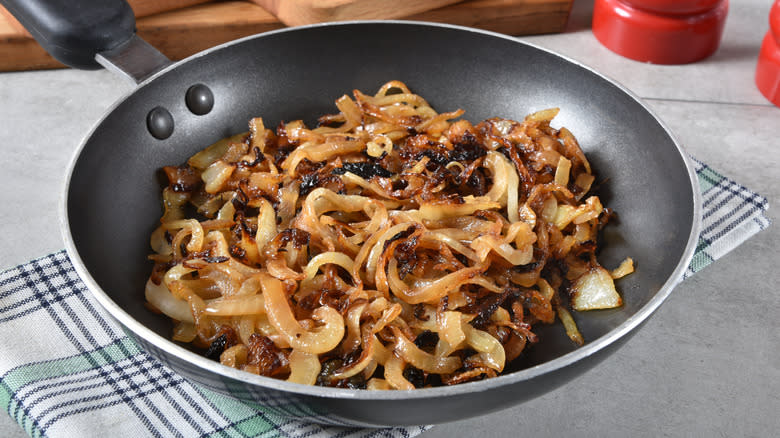
Caramelized onions are a thing of pure joy, requiring little more than heat, fat, and time to create a complex, sweet foodstuff. But, if you've ever been told that you can caramelize onions quickly by simply cranking up the heat, you've been fooled. Some recipes claim that you can caramelize onions in as little as 5 to 10 minutes, but this is, unfortunately, nonsense. Cooking onions low and slow allows them to release moisture and sugars properly, which ushers in the Maillard reaction, making the vegetables brown and sticky. Cooking them for just 5 to 10 minutes on low heat, though, will result in onions that have barely changed. And, if you try and speed it up by cranking up the heat, you'll just burn them.
There are, however, ways to hasten the caramelization process slightly. Baking soda is the key to doing this. A pinch of baking soda, which is alkaline, will alter the pH structure of an onion, reducing its acidity and making it brown faster. While it will speed things up, though, it definitely won't make it caramelize in 5 minutes flat. Bear in mind, too, that baking soda can break down the structure of onions considerably, potentially leaving you with an overly-soft result. ?
Myth: Biting A Wooden Spoon Will Stop You Crying When Chopping Onions

When it comes to cutting onions, the struggle is very real. Upon being sliced into, onions release a gas called propanethial S-oxide, which grows in abundance in the plant to stop animals nibbling at them as they grow. This gas is an irritant and aggravates the tissue in our eyes, which is why you end up a sobbing mess whenever you make dinner.
This near-universal problem is, for many, a lifelong struggle, and has led to some pretty wacky remedies. But, if you've ever been told that biting a wooden spoon will help, you've been misled. The thought behind it is that the wood will absorb the gas as it drifts up to your eyes, but it does no such thing. And, while biting down hard might cause you to squint a little, unless you're closing your eyes entirely (which we wouldn't recommend), the propanethial S-oxide can still get in there.
Other methods, like chewing gum while chopping, burning a candle, or freezing onions, have also been found to be ineffective. In reality, the best method is to cover your eyes while slicing onions, so that the gas can't reach your eyeball. A pair of kitchen goggles, or even regular swimming goggles, will provide a seal around your eyes to protect them. ?
Myth: The Only Thing That Reduces Onion Breath Is Time
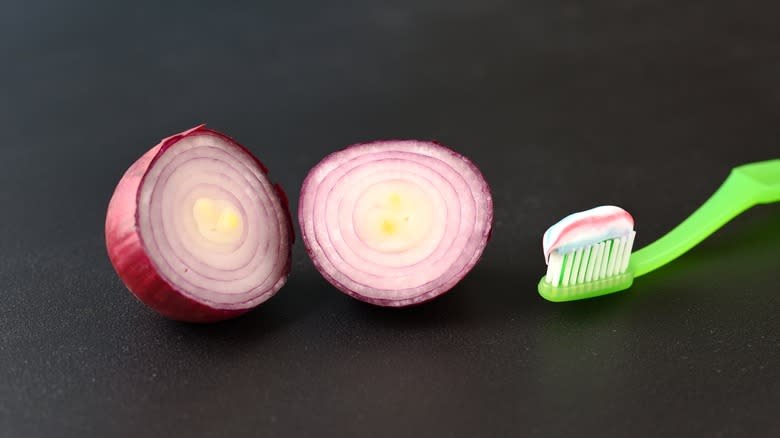
If you've ever had a first date or a job interview go drastically wrong because of your lunch choices, you'll know how annoying onion breath is. Onions are full of sulfur compounds which can lodge in our teeth and on our tongue after eating onions, with further compounds also leaking out through our pores.
However, while you should avoid onions to stop the smell from getting on your skin and clothes, you can take comfort in the fact that there are several remedies that can reduce onion breath. The most effective method is to give your teeth a brush and floss after eating them, as this will help to dislodge any sulfur particles that have taken residence in your mouth. This will also have the added bonus of getting rid of any other bacteria in your mouth or on your tongue. Chewing some gum can also help to shift sulfur compounds and bacteria, and will provide a minty taste and scent that can mask the smell. Drinking milk or lemon water can also be an effective solution, as both of these liquids have compounds in them that can neutralize onion smells.
Myth: White, Red, And Yellow Onions All Taste The Same
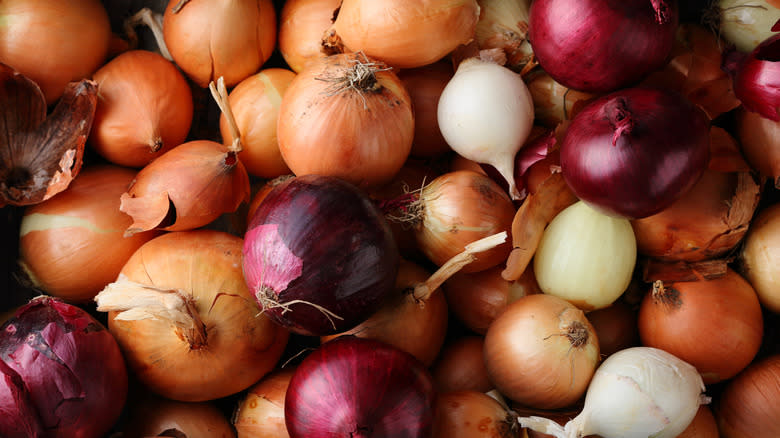
Onions come in various shapes and sizes, but arguably the most commonly used types are the round, dense varieties. These tend to be widely available in white, red, and yellow colors. But, while they can be used interchangeably in many situations, it's a mistake to think that they're identical in flavor.
Yellow onions (also known as brown onions, because of the light-brown color of their exterior skin) have a nutty edge to their flavor when cooked, making them the ideal choice for caramelizing or sweating into chili or bolognese. White onions have a brighter flavor and tend to be better used in recipes that call for raw onion. And, while you might expect red onions to be stronger or more pungent than the other two, due to the variety's dark-red color, they actually tend to have the gentlest flavor of the three. Because they have a higher sugar content, they're also usually sweeter.
Other types of allium, like shallots or green onions, do tend to have a noticeably different flavor, with shallots having a slightly garlicky hint to them and green onions being milder. As such, it's harder to swap these types in if your recipe calls for a yellow, white, or red onion. ?
Myth: Leaving Sliced Onions Around Will Prevent Airborne Illnesses
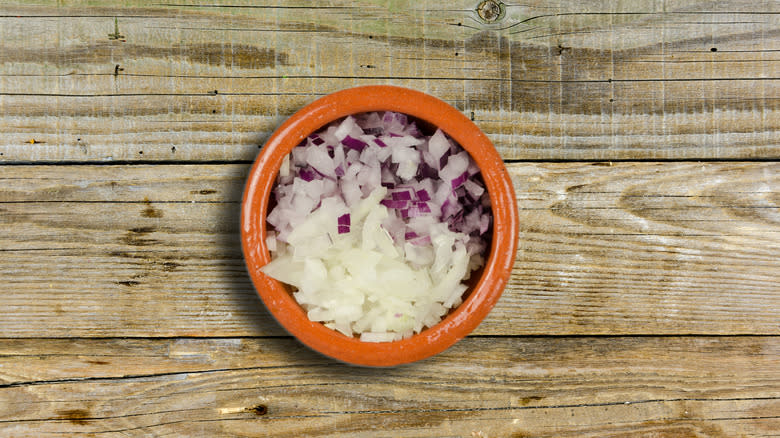
The idea that sliced onions can somehow prevent airborne pathogens has been around for centuries. The first uses of the plant as a way to ward off illness occurred during the time of the bubonic plague, circa the 16th century. During this period, knowledge about what caused disease was limited, and it was thought that breathing "bad air" (also known as miasma) was what made people sick. Along with vinegar, spices, and herbs, onions emerged as a way to mask or rid the home of this unpleasant air.
Incredibly, this myth continued to exist well into the 20th century, and the use of onions as prevention cropped up during various epidemics and pandemics, thinking that they absorb various pathogens. In truth, though, they don't do anything at all. Illnesses like the flu, for example, are passed around by contact with infected water droplets from a sick person who ejects them by sneezing, coughing, or even talking, halting the idea that contagious diseases are just floating around in the air, ready for the onion to absorb. While onions have no ability to kill pathogens that are somehow airborne, the only thing they'll do is make your house smell of sliced onion.
Myth: You Should Eat Onions Before Bed

If you have trouble sleeping, you might have tried a range of solutions to get your zzz's in. But, if you've ever bought into the myth that onions will help, we're afraid you're mistaken, although the thought is a logical one, due to the vegetable's high concentration of sulfoxides. Amongst their other health benefits, sulfoxides have been promoted as a sleep aid, and a study published in Food Science and Biotechnology found that taking an onion extract rich in sulfoxides had a positive and rapid effect on sleep quality and sleep onset.
Unfortunately, though, just eating onions alone probably won't help. While sulfoxides are in high quantities in onion extracts, in regular onions there likely aren't enough to have any effect on your sleep health. Additionally, any benefits of eating onions on sleep health haven't been found in any studies.
Additionally, eating raw onions may actually have a negative impact on your sleep. Raw onions are high in acid, and eating acidic foods just before bed can prompt acid reflux, which can get worse when people are lying down in bed, as stomach acid is able to rise up into the upper digestive tract more easily. This can stop you from getting to sleep, or cause you to wake up in the night. ?
Myth: Onions Will Help In The Bedroom
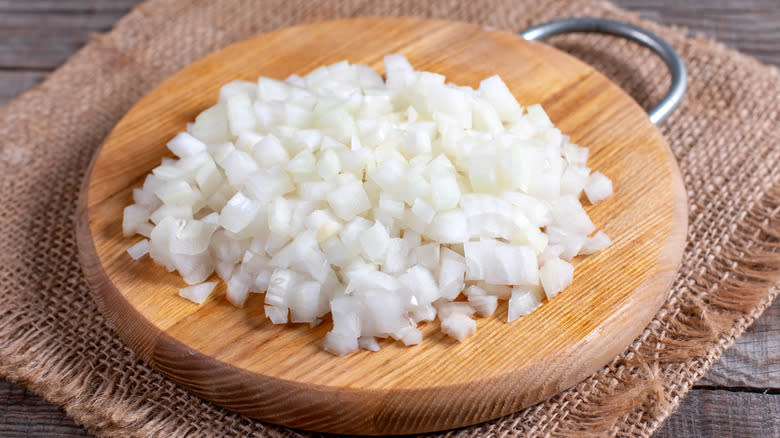
There are many foods out there that have been claimed to be aphrodisiacs, with oysters, figs, chocolate, and even asparagus cited as items that can put you in the mood. But, the idea that onions will have a positive effect on you and your partner's love life is misguided. This myth stems from the effect of onions on testosterone production. Testosterone is a key hormone for sexual reproduction in males, and in research published in Biomolecules, it was observed that numerous studies have shown that onions boost testosterone production.
However, the vast majority of these studies were performed on male rats, with only one study done with humans. Additionally, this effect has only been found in males, and there's been no such boost of hormone production observed in female subjects. As such, it's not wise to assume that munching on onions will make things more romantic. And besides, we're pretty sure that having to battle with onion breath will be an immediate turn-off. ?
Myth: You Can't Use Onion Skins For Anything
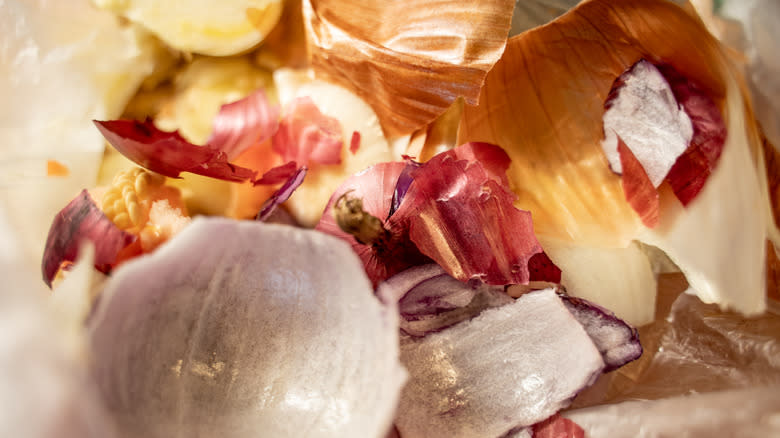
One of the first things most people do when preparing onions is to peel off their outer skins and throw them in the trash or the compost heap. And, we can understand why: Onion skins are cured which removes their moisture and turns them papery, brittle, and pretty unappetizing.
But, it's false to assume that onion skins are useless. In fact, they can be incorporated into a range of recipes to provide additional flavor and nutrients. Onion skins can be added to any liquid-based dish you're making to imbue it with an oniony taste, and they're a great ingredient in stock. They can also be added to the water or stock you use when you cook rice or couscous (just make sure you fish them out afterward).
Onion skins also have a protective effect, making certain cooking methods much easier. By leaving onion skins on when you roast onions, you protect the flesh inside from becoming burnt, and instead, your vegetables become soft and juicy. You can even roast your onion skins on their own, before grinding them up and using them as a condiment or spice for a host of dishes.
Myth: Onions Are Only Useful In Your Kitchen

Many of the myths around onions, like their ability to prevent illness, have been disproven. And, this can lead people to believe that their only real value is as an ingredient. But in reality, onions do have several non-culinary uses that might surprise you. One use that sounds totally fake but is in fact real is for hair growth. While onions may not reverse baldness, several studies, including one from the Journal of Drug Delivery and Therapeutics, have noted that using onion juice on hair can make it more nutrient-rich and cause it to grow faster. The downside of this, of course, is that you have to endure smelling of onions to gain the benefit.
Onions also have a preventive effect on ice forming on a windscreen, thanks to their natural sugar content. All you have to do is rub a sliced onion over the windscreen before the temperature drops at night, and in the morning, you'll have an ice-free window. The same effect can be achieved by rubbing a potato on the windscreen -- and using one of these, instead of an onion, will likely cause your car to smell less pungent.
Read the original article on Daily Meal.
